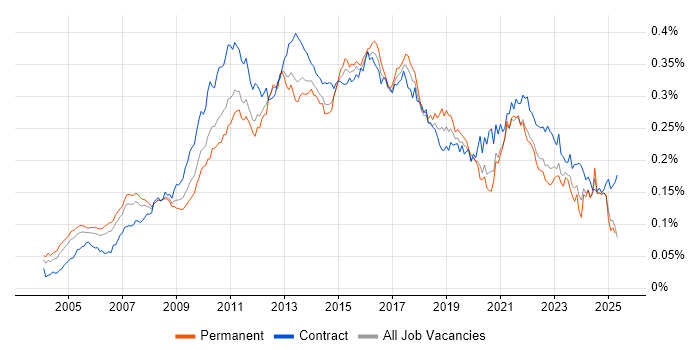Business IT Analyst
UK
The median Business IT Analyst salary in the UK is £60,000 per year, according to job vacancies posted during the 6 months leading to 16 May 2025.
The table below provides salary benchmarking and summary statistics, comparing them to the same period in the previous two years.
| 6 months to 16 May 2025 |
Same period 2024 | Same period 2023 | |
|---|---|---|---|
| Rank | 657 | 780 | 829 |
| Rank change year-on-year | +123 | +49 | +55 |
| Permanent jobs requiring a Business IT Analyst | 54 | 115 | 150 |
| As % of all permanent jobs advertised in the UK | 0.097% | 0.12% | 0.15% |
| As % of the Job Titles category | 0.11% | 0.12% | 0.16% |
| Number of salaries quoted | 51 | 110 | 127 |
| 10th Percentile | £42,500 | £37,320 | £38,500 |
| 25th Percentile | £46,750 | £45,750 | £42,500 |
| Median annual salary (50th Percentile) | £60,000 | £49,500 | £50,000 |
| Median % change year-on-year | +21.21% | -1.00% | - |
| 75th Percentile | £69,375 | £53,500 | £63,750 |
| 90th Percentile | £76,250 | £57,750 | £74,250 |
| UK excluding London median annual salary | £57,500 | £49,500 | £45,000 |
| % change year-on-year | +16.16% | +10.00% | - |
All Permanent IT Job Vacancies
UK
For comparison with the information above, the following table provides summary statistics for all permanent IT job vacancies. Most job vacancies include a discernible job title that can be normalized. As such, the figures in the second row provide an indication of the number of permanent jobs in our overall sample.
| Permanent vacancies in the UK with a recognized job title | 50,303 | 93,916 | 91,216 |
| % of permanent jobs with a recognized job title | 90.61% | 94.69% | 91.48% |
| Number of salaries quoted | 27,096 | 67,168 | 57,442 |
| 10th Percentile | £29,750 | £28,500 | £32,500 |
| 25th Percentile | £41,250 | £38,500 | £45,000 |
| Median annual salary (50th Percentile) | £56,000 | £52,500 | £60,000 |
| Median % change year-on-year | +6.67% | -12.50% | - |
| 75th Percentile | £73,886 | £71,250 | £80,559 |
| 90th Percentile | £96,250 | £90,000 | £100,000 |
| UK excluding London median annual salary | £51,645 | £50,000 | £53,000 |
| % change year-on-year | +3.29% | -5.66% | +5.64% |
Business IT Analyst
Job Vacancy Trend
Job postings that featured Business IT Analyst in the job title as a proportion of all IT jobs advertised.

Business IT Analyst
Salary Trend
3-month moving average salary quoted in jobs citing Business IT Analyst.
Business IT Analyst
Salary Histogram
Salary distribution for jobs citing Business IT Analyst over the 6 months to 16 May 2025.
Business IT Analyst
Top 11 Job Locations
The table below looks at the demand and provides a guide to the median salaries quoted in IT jobs citing Business IT Analyst within the UK over the 6 months to 16 May 2025. The 'Rank Change' column provides an indication of the change in demand within each location based on the same 6 month period last year.
| Location | Rank Change on Same Period Last Year |
Matching Permanent IT Job Ads |
Median Salary Past 6 Months |
Median Salary % Change on Same Period Last Year |
Live Jobs |
|---|---|---|---|---|---|
| England | +95 | 53 | £60,000 | +21.21% | 19 |
| London | +105 | 27 | £60,000 | +13.21% | 8 |
| UK excluding London | +125 | 23 | £57,500 | +16.16% | 18 |
| Work from Home | +79 | 14 | £57,500 | +16.16% | 19 |
| South West | +102 | 10 | £60,000 | +29.03% | 4 |
| West Midlands | +61 | 7 | £48,500 | +12.79% | 2 |
| Midlands | +55 | 7 | £48,500 | -2.02% | 3 |
| North of England | +48 | 3 | £57,500 | +4.55% | 3 |
| North West | +4 | 3 | £57,500 | -4.17% | 2 |
| South East | +82 | 2 | £62,500 | +23.76% | 5 |
| Scotland | +107 | 1 | £48,500 | +28.31% |
Business IT Analyst Skill Set
Top 30 Co-occurring Skills and Capabilities
For the 6 months to 16 May 2025, Business IT Analyst job roles required the following skills and capabilities in order of popularity. The figures indicate the absolute number co-occurrences and as a proportion of all permanent job ads featuring Business IT Analyst in the job title.
|
|
Business IT Analyst Skill Set
Co-occurring Skills and Capabilities by Category
The follow tables expand on the table above by listing co-occurrences grouped by category. The same employment type, locality and period is covered with up to 20 co-occurrences shown in each of the following categories:
